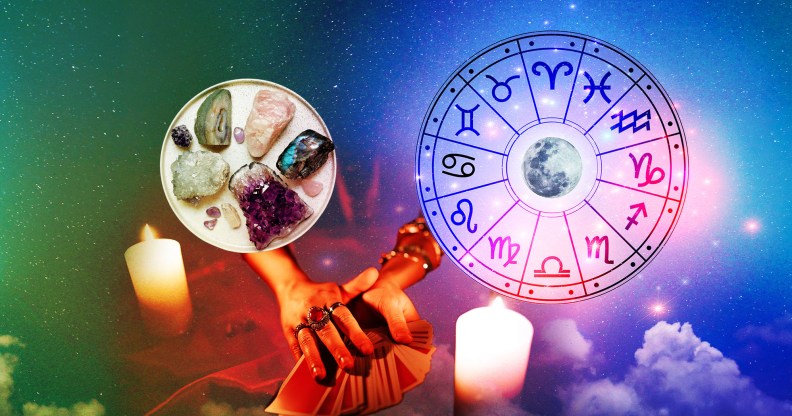In defence of ‘woo-woo gays’: Astrology, tarot and queer spiritualities can be tools of power

Queer spiritualities have a long history. (Getty)
We all know an astrology gay, a lesbian with crystals and a transfemme who insists that her ancestors were worshipped as deities. While many may roll their eyes at these phenomena and behaviours, Jackson King thinks there’s something to be said for queer spiritualities.
As with anything, spiritual practices can be used and abused by bad players. I’m thinking queer housing ads that explicitly state “no Capricorns”, or the TikTok tarot readers who only ever seem to have a message about your ex getting back with you.
But on a personal level, I’ve found my burgeoning tarot practice to be an invaluable tool for self-reflection and personal growth. Is taking a moment out of your day to think through the challenges you’re facing with some creative and symbolic visual prompts so bad?
Before we get into it, let me gently invite naysayers to check their colonialism at the door. The negative connotations some of us have inherited towards practices such as hoodoo and obeah are rooted in Christianisation and European misframings of traditional African religions. And I think modern framings of spiritualities and mysticisms in general – as unenlightened, irrational clap-trap – likely find their origin in that colonial civilised vs savage idea too.
Look at the biggest proponents of New Atheism, and you’ll find they all look very male, pale and stale. Personally, I’m suspicious of this way in which white men’s ideas continue to be better and smarter than everyone else’s!
Here’s my proposal: think of spirituality as a tool. Maybe it’s not your tool, but it is someone else’s. And frankly, given we’re all on a rock hurtling not only through space but towards climate disaster and nuclear destruction – let the girls have their things!
Some of us turn to long-distance running for stress-relief, others to the tarot deck.
Spirituality had a role in slave rebellions
It’s not just on an individual level that spirituality can have its uses. It’s also a tool with political potential. For example, spiritual traditions and practitioners played a significant role across a number of North American and Caribbean slave rebellions.
In Jamaica, the Tacky Rebellion of 1760 – the largest Caribbean slave uprising in the 18th-century – was deeply influenced by ‘obeah men’ who advised and offered spiritual protection to its leaders. As a result, the practice of obeah was outlawed by the British, and remains illegal in Jamaica to this day. And the Haitian Revolution of 1791, which began with a slave rebellion and ended with emancipation and independence, was initially led by none other than Boukman Dutty, a Vodun high priest.
Spirituality makes an appearance in more recent history books too. Do you know of the Radical Faeries? Perhaps you don’t. But perhaps you do and the term conjures images of queer men frolicking through the forest with woven baskets and drums, meandering towards the sex magic ceremony tent…
What you might not know is that the Radical Faeries were founded by two queer men who played no small part in the gay liberation movement. Harry Hay was also a founding member of the Mattachine Society, a pre-Stonewall gay rights organisation in the US. And his faerie movement co-founder, Don Kilhefner, was a central part of the Gay Liberation Front, as well as the driving force behind the Los Angeles LGBT Center – now the world’s largest facility providing LGBTQ+ services.
In light of this, I say let the faeries frolick!
I think what we’re really talking about when we discuss spirituality is power. Lack of it, desire for more of it, and also fear of it too. As queer and otherwise marginalised people, we live in a world that does all it can to render us small and helpless.
Now don’t get me wrong, some gays are too powerful (RuPaul I’m looking at you), but the majority of us are in some way at the mercy of forces and agendas beyond our control. I think spirituality, when used in a considered, self-aware and intentional way, can be a tool (as psychological placebo effect, or as objective reality) for the powerless to become powerful.
Whether finding the power to change yourself or your circumstances as a collective, it’s a practice of hope and possibility, and that in itself is valuable.
How did this story make you feel?

